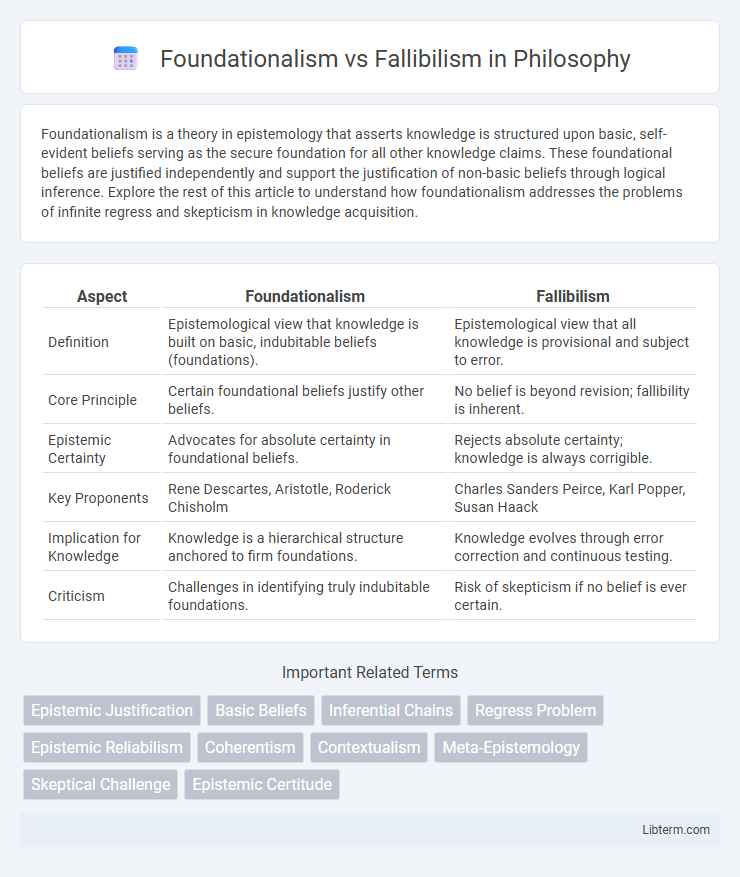Foundationalism is a theory in epistemology that asserts knowledge is structured upon basic, self-evident beliefs serving as the secure foundation for all other knowledge claims. These foundational beliefs are justified independently and support the justification of non-basic beliefs through logical inference. Explore the rest of this article to understand how foundationalism addresses the problems of infinite regress and skepticism in knowledge acquisition.
Table of Comparison
| Aspect | Foundationalism | Fallibilism |
|---|---|---|
| Definition | Epistemological view that knowledge is built on basic, indubitable beliefs (foundations). | Epistemological view that all knowledge is provisional and subject to error. |
| Core Principle | Certain foundational beliefs justify other beliefs. | No belief is beyond revision; fallibility is inherent. |
| Epistemic Certainty | Advocates for absolute certainty in foundational beliefs. | Rejects absolute certainty; knowledge is always corrigible. |
| Key Proponents | Rene Descartes, Aristotle, Roderick Chisholm | Charles Sanders Peirce, Karl Popper, Susan Haack |
| Implication for Knowledge | Knowledge is a hierarchical structure anchored to firm foundations. | Knowledge evolves through error correction and continuous testing. |
| Criticism | Challenges in identifying truly indubitable foundations. | Risk of skepticism if no belief is ever certain. |
Understanding Foundationalism: Core Principles
Foundationalism asserts that knowledge is structured like a building, supported by basic beliefs that are self-evident, infallible, or evident to the senses, serving as the secure basis for all other beliefs. These foundational beliefs provide the justification for higher-level, non-basic beliefs through a hierarchical system of knowledge. Understanding foundationalism involves recognizing its core principle that certain fundamental truths are necessary to avoid infinite regress in justification.
The Essence of Fallibilism Explained
Fallibilism centers on the belief that all knowledge claims are inherently uncertain and subject to revision based on new evidence or reasoning. Unlike foundationalism, which asserts certain basic beliefs as infallible foundations for knowledge, fallibilism accepts that even foundational beliefs can be mistaken. This epistemological approach promotes continuous inquiry and skepticism, emphasizing the provisional nature of human understanding.
Historical Roots of Foundationalism
Foundationalism traces its roots back to ancient philosophy, notably with Aristotle's theory of knowledge as structured on self-evident principles. In the early modern period, thinkers like Descartes further developed foundationalism by seeking indubitable foundations for knowledge through a method of radical doubt. The historical evolution of foundationalism highlights its aim to establish certain, unshakable beliefs as the base for all other knowledge claims.
Key Thinkers in Fallibilist Philosophy
Key thinkers in fallibilist philosophy include Charles Sanders Peirce, who emphasized the provisional nature of knowledge and the ongoing process of inquiry. Karl Popper advanced fallibilism through his principle of falsifiability, asserting that scientific theories cannot be conclusively proven but can be rigorously tested and potentially refuted. W.V.O. Quine further contributed by challenging the analytic-synthetic distinction, promoting a holistic view of knowledge where all beliefs are subject to revision based on empirical evidence.
Core Differences: Foundationalism vs Fallibilism
Foundationalism asserts that certain basic beliefs are infallible and serve as the secure foundation for all other knowledge. Fallibilism rejects the idea of absolute certainty, stating that all beliefs, even foundational ones, are subject to revision based on evidence or argument. The core difference lies in Foundationalism's emphasis on certainty and indubitable beliefs versus Fallibilism's acceptance of the inherent uncertainty in all knowledge claims.
Epistemic Justification: Competing Perspectives
Foundationalism asserts that epistemic justification rests on basic beliefs that are self-evident or incorrigible, serving as the secure foundation for all other knowledge. In contrast, Fallibilism maintains that all beliefs, including those considered foundational, are subject to doubt and revision, emphasizing the provisional nature of justification. These competing perspectives shape debates on the structure and limits of knowledge, affecting theories on how justification is acquired and validated in epistemology.
Criticisms of Foundationalism
Critics of foundationalism argue that its reliance on indubitable basic beliefs is problematic, as few or no beliefs can meet this criterion without circularity or arbitrariness. The rigid structure foundationalism proposes often fails to account for the dynamic and revisable nature of human knowledge, making it less flexible in the face of new evidence. Furthermore, fallibilists highlight that all beliefs, including foundational ones, are potentially subject to error, undermining the certainty foundationalism seeks to establish.
Challenges to Fallibilism
Challenges to fallibilism center on its acceptance of the inherent uncertainty in all knowledge claims, which can lead to skepticism and undermine the possibility of absolute truth. Critics argue that if all beliefs are potentially fallible, the foundation for knowledge becomes unstable and difficult to justify. This creates tension with foundationalism, which seeks certainty through indubitable basic beliefs that support further knowledge construction.
Relevance in Contemporary Epistemology
Foundationalism asserts that certain basic beliefs provide the ultimate justification for knowledge, serving as an epistemic bedrock immune to doubt, while fallibilism acknowledges that all beliefs, including foundational ones, are susceptible to revision based on new evidence. In contemporary epistemology, the relevance of this debate centers on balancing the quest for epistemic certainty with the acceptance of human cognitive limitations and the dynamic nature of knowledge. This tension influences approaches to justification, rational belief formation, and the development of epistemic frameworks that accommodate both stability and adaptability in knowledge acquisition.
Bridging the Divide: Is Reconciliation Possible?
Bridging the divide between foundationalism and fallibilism involves recognizing that basic beliefs can serve as rational foundations while remaining open to revision based on new evidence. Foundationalism's emphasis on certain, self-evident truths can be tempered by fallibilism's acknowledgment of human cognitive limitations and the probabilistic nature of knowledge. This synthesis promotes a dynamic epistemology where foundational principles provide a starting point but accommodate fallibility through ongoing critical scrutiny and adjustment.
Foundationalism Infographic

 libterm.com
libterm.com